Principal's Page

Kia Ora Friends - Namaste and Fakaalofa Lahi Atu
It's Niuean Language Week and we are also celebrating Diwali at Western Heights this week.
Today is the first meeting of our newly elected Board of Trustees, a special day for our new Board members.
For many years I was guilty of putting myself down in my self-talk. It's an easy thing to do and a hard habit to break. So it's an important topic to consider and focus on with our children to help avoid it becoming a hard-to-break habit for them. Hopefully the article below will help.
Some Thoughts on Self Talk and Restorative Practice:
At Western Heights, we talk often a lot about restoring relationships, not punishing mistakes. That’s because we believe our children, and all of us, are learners and are works in progress. When I have to talk to children who have made a mistake or two, I remind them that we all make mistakes, pretty much every day. I remind them that even though I'm old, I still make a heap of mistakes. I still sometimes do and say things without thinking.
Every choice we make teaches us something, and how we respond when things go wrong shapes who we become. Because we all make mistakes I ensure children understand that the key to resolving them starts and ends with honesty. I don't get mad with mistakes but I do become very disappointed about dishonesty. We cannot fix anything unless first we are honest - more on this later.
Recently I came across a simple quote that captures the heart of our Restorative Practice philosophy:
“It’s: I did a bad thing, not I am a bad person.
It’s: I tried and failed, not I am a failure.
It’s: I did it wrong, not I am wrong.
How you talk to yourself defines your Self. Be careful what you say.”
In restorative work, we separate the person from the behaviour.
When a child makes a poor choice, our first aim is to help them take responsibility for their choice - this starts with being honest.
Then we help the child understand the impact of that choice. If there is a victim, it's the victim who is going to help them understand those impacts.
Finally we help the child to take steps to repair the harm. If there is a victim, it's the victim who decides if and when the harm has been repaired.
The focus isn’t blame or shame, it’s learning, reflection, and growth. We don't want to scare children into being good through the threat of heavy-handed punishment. We want to speak to their hearts and help them understand how and why their choice was wrong and hurtful. Most importantly, we want them to have a change of heart, and not want to repeat those choices.
From my own experience as a pretty troublesome boy, heavy-handed punishments just made me try harder not to get caught. Not helpful or good.
Coming back to the last part of that quote -
How you talk to yourself defines your Self. Be careful what you say.”
This principle doesn’t just apply to children. It’s something we all need to remember. The words we use about ourselves, especially after a mistake, or falling short, can either shrink us or help us grow. “I failed” becomes a full stop. “I tried and failed this time” leaves the door open to learning. "I can't" is another full stop. "I can't - YET..." really leaves the door open.
At Western Heights, we want our learners, students and adults, to hold onto that idea of separating the deed from the doer. It allows for accountability without damaging self-worth. It encourages ownership without fear. And most importantly, it builds resilience that helps us stand back up, learn, and try again.
So, this week, maybe pause to notice your inner dialogue, or your child’s. Are the words we use helping us grow, or holding us back? Restorative thinking starts with how we speak to ourselves.
Sharing a lovely email I received:
Dear Ash,
Thank you for welcoming me so warmly into your whānau and teaching team. I’ve thoroughly enjoyed my time here at Western Heights supporting where I could. It has reaffirmed my confidence that my son is in exactly the right place, surrounded by and guided by strong, nurturing leadership.
WHS carries a magnificent wairua that is both captivating and deeply inspiring. I wish you and your whānau the safest and most fulfilling journey from here forward. Please pass on my heartfelt thanks to your teaching staff for trusting me with their tamariki and enriching my experience. Their support has been overwhelming and appreciated.
My cup is overflowing.
Arohanui.
As always, if you have questions or concerns about anything school-related, email me at macash@mac.com, and I will get back to you asap.
My very best regards to you all,
Ash Maindonald
Principal.

